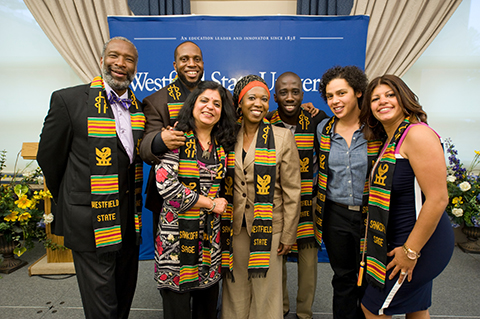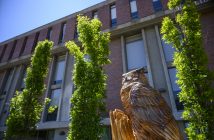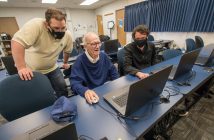Westfield State has transformed in 175 years from a teaching college to a diverse university with 31 majors.
As Westfield State arrives at its 175th anniversary, four professors discuss what’s different, what’s remained the same and what they value about the University.
Beth Ann Rothermel, English
A 17-year veteran of Westfield State, Beth Ann Rothermel, professor of English, says one of the biggest changes on campus is the diverse faculty.
“There were not a lot of women my age on the faculty across campus when I started in 1996, but that has changed considerably,” Rothermel says.
What has remained consistent is the connection between students and professors.
“I am glad that even as enrollments increase, we continue to have small classes and chances to work one-on-one with students through independent studies, student teaching, graduate capstones and honors projects,” Rothermel says. “I am still able to get to know students in a way that was hard to do at the big university (University of Texas at Austin), where I did my graduate work and started my college teaching career.”
Rothermel also reports that student life is more vivacious now, with over 70 clubs and 1,500 activities to choose from.
“I feel as if the campus is much more visibly lively than when I arrived,” she says. “I love seeing students outside reading or talking in the Adirondack chairs.”
In addition to her teaching at Westfield State, Rothermel has a passion for the history of women’s education, and Westfield State’s archives have allowed her to pursue that passion. She has written and published four articles on the academic and extracurricular experiences of women attending the University in the 19th and early 20th centuries.
“I have been excited to see my work on Westfield State cited by other scholars in my field doing research on women’s and teacher education,” Rothermel says. “My work in the archives makes me feel an even stronger connection to the institution, and I try to find ways to share this history with my students.”
Gerald Tetrault, Philosophy
Coming from the urban environment of Boston University was initially a culture shock for professor of philosophy Gerald Tetrault, but for the past 47 years, he has enjoyed and adapted to the quaint, rural environment.
“When I came aboard in 1967, Westfield State was but a few red brick buildings nestled in a bucolic setting of high pines,” Tetrault says. “Yet, I soon warmed to the intimacy of the place, especially to my colleagues in Philosophy, from whom I learned so much. Teaching in a small college grew on me and seemed the ideal setting for a contemplative life.”
Still the smallest department at the University, Tetrault says that he and his fellow philosophy professors have expanded their relationships to other departments on campus.
“We enjoy productive relations with professional as well as arts and sciences departments, whose students seek out our courses not only for credit but for intellectual challenge and enrichment,” Tetrault says.
The University prides itself on being a “private-quality” institution at a “public value,” and Tetrault reports that his students are at the same level academically as those he taught at Boston University, and they have better attitudes.
“Generally, students at Westfield State are ‘real,’ unpretentious, and every bit as bright as those at BU,” Tetrault says.
“I enjoy working at Westfield State because of my students and fellow professors,” Tetrault says. “The particular feature of University life I favor most is my classroom with old-fashioned blackboards and students willing to learn.”
Erika Pilver, Political Science
Professor of political science Erika Pilver has seen Political Science transform into its own department since her start in 1975.
“When I arrived, the two professors teaching political science were in the History department,” Pilver says. “My first year here, we worked to get Political Science as a department and were successful.”
The department now has six full-time and two to three part-time faculty members. It has expanded to allow new topics of study, including international relations, public administration and Asian studies.
Pilver reports that throughout her nearly 40 years of teaching, her favorite memory was when Evan S. Dobelle became president.
“He brought to the campus an excitement for students as well as others,” Pilver says. “He elicits opinions from those on campus and listens to them. He has also protected department lines and other jobs, contrary to what has been done on other campuses.”
“Continual progress” is what Pilver says has remained consistent throughout her career at the University. It has transformed from a teaching
college to a university with 31 different majors with 43 concentrations.
When it comes to her favorite facet of working at Westfield State, like Tetrault, Pilver says it’s all about the positive attitudes.
Shirley Acquah, Communication
While professor of communication Shirley Acquah has just finished her first year of teaching at Westfield State, the University and its faculty have made quite an impression on her.
“The faculty and administrative staff in my department are caring and extremely supportive,” Acquah says. “Each person is always willing to help in any way they can, and this made my assimilation process seamless.”
Acquah said that though she came from Ohio State, a much larger university, she is impressed with Westfield State’s diversity programs.
“I find that initiatives such as the Short-Term International Study Abroad and Sankofa (which promotes unity and diversity) are excellent activities that will broaden students’ horizons and knowledge,” Acquah says.
In addition to the diverse faculty and programs, Acquah said that she has enjoyed working and connecting with her students.
“Working with students at Westfield State has been rewarding,”Acquah says. “Not only do we co-construct knowledge in the classroom, but I get to know them as individuals outside of class.”
Acquah says that overall, she had a successful first year teaching and was able to establish a connection to the University.
“I have thoroughly enjoyed my first year here, and this has been possible due to the support I received from faculty in my department as well as other staff and faculty on campus,” Acquah says. “Moreover, the sense of community within the University makes it an endearing place to work.”




